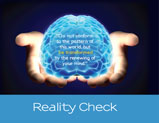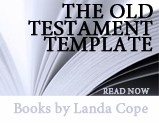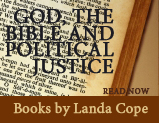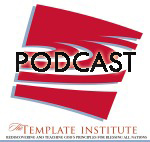Dio, Giustizia Bibbia e politici: Capitolo 7
Parte seconda: Mosè e la legge prescrittiva
Capitolo 7
Il modello delle leggi
Nowhere does the Law weave the values of the Kingdom more delicately and beautifully than when applied to public justice. It is so intricate that it is difficult to know which value thread to begin with in unweaving it. There are innumerable ways to look at and analyze what God is giving us in these passages. For our purposes in this volume on government and civil law I am using a matrix of three categories of crime: perdere di vita, danni fisici e perdere di proprietà e quattro categorie di conseguenza: pena di morte, ergastolo, restauro e punitiva. Con queste categorie possiamo guardare a tutto ciò che la legge prescrittiva prevede come reato.
Mi immagino lo studio della Scrittura come disfare mentalmente i fili di un arazzo ornato al fine di comprendere le parti che compongono il tutto. I fili non stanno da soli; only together do they produce the picture. But the threads are the foundational parts of the whole and lay out the grid work that makes the tapestry possible. Come il reverse engineering di mobili scatola piatta, prendiamo tutta la Scrittura a pezzi e capire gli elementi di Dio sta enfatizzando in modo da comprenderlo e renderlo più facile da rimontare di nuovo nella nostra vita.
In Deuteronomio capitolo uno, God initiates a revolutionary idea to curb man’s great appetite for violence and injustice. God makes the human race responsible for governing themselves. They will choose their leaders. They will choose the laws and they will choose consequences for breaking those laws. God will give Israel His thoughts on these subjects but the authority will be theirs to maintain or change their direction. Consenso, rappresentante, basso verso l'alto potere politico nasce.
Ricordate come abbiamo camminato attraverso Genesis, le conseguenze del peccato, separazione da Dio, sono morte ... sempre. We all die physically because sin came into the world. As God continues in Genesis He hammers home the fruit of sin is death. We begin with brother killing brother and continue until the entire human race is so violent, that human life is endangered entirely. The flood and rebooting of human existence through Noah are God’s just and merciful option. But again man’s decent into violence in Abraham’s family is so rapid that in just three generations they have moved to near fratricide of Joseph and genocide of the Shecemites. A 435-year generational sentence is imposed on Israel as a nation in order to create an understanding of the value of human life.
Now God liberates and gives Israel the Law. The prescriptive parts of the Law are very clear. In essence God is saying, se tu sapessi quello che so, si dovrebbe "eliminare questo male" dalla vostra società, perché queste sono le cose che porteranno ad un aumento della violenza e la perdita di vite umane; sesso, abuso di potere e avidità.
In altre parole, nella Legge, Dio ci sta dicendo chiaramente come creare sicuro, life sustaining communities and making us responsible to do it. The burden of justice is now on our shoulders. We are free to change the laws God has given and we are free to evaluate the consequences, the fruit of our choices. Are we stopping violent deaths of our fellow citizens or is it increasing? Is our mercy succeeding where God’s has failed us? Se non, qualcosa deve essere sbagliato con le nostre scelte.
Diritto Civile vs. Legge Morale
Al fine di interpretare le leggi di Mosè e della storia di Israele nei nostri eventi attuali dobbiamo capire la differenza tra due date autorità Dio, l'autorità di "diritto civile" e quello di "legge morale".
All "legge" è morale, nel senso che si dice, “this is right and this is wrong.” In setting a standard of “acceptable behavior” we must make judgments of what is “good or bad.” But not all “morality” can be made a matter of civil “law.” By giving us responsibility to decide God makes us look at the implications of our choices by the impact on the society we live and raise our children in. Diritto civile, che rappresenta il popolo, will never be more moral than the majority of the people it represents. Ma, a more moral people will seek a higher level of civil law. There in lies the tension between the work of the Pastor and the work of the President.
Both civil and moral laws are given authority from God. But they are two different kinds of authority with two different functions. One must have the will of the people behind it in order to have the power to govern. The other must have the will of God behind it to have authority and the blessing of God. One reveals the standards of the people and the other reveals the standards of God. One must seek the support of the people or to change the thinking of the people in order to have authority. The other must ignore the thinking of the people and represent God alone in order to have authority. They are divinely disagreeable in the purposes of God. And we must have both to keep the Kingdom tension of justice in human society. Civil law must be continually committed to keeping the rights of both safeguarded. Questo è il dilemma e la tensione divina.
Il modello
The Law seems like a maze in part because of its circular story telling style. We see themes rotating and weaving throughout but they are difficult to grab hold of. Perché io sono dyslectic è essenziale per me di ordinare le informazioni di conservarlo. Quindi ho usato il colore per aiutarmi anche in questo studio della legge, come ho fatto in studio dei Domini nel volume introduttivo. I divided out the prescriptive parts of the Laws of Moses. Those parts of the Law that tell us to “do this but do not do this,"Come il 10 comandamenti. Queste porzioni "prescrittivi" si trovano in Esodo, Levitico, Numeri e Deuteronomio. E cominciando da Deuteronomio, perché è considerato dagli studiosi ebrei e cristiani di essere il "libro di nucleo,"Ho assegnato ogni tema nella legge prescrittiva un colore quando è apparso nella mia lettura e da allora utilizzato quello stesso colore ogni volta che il soggetto riapparso. Una volta avevo usato Deuteronomio definire lo schema quindi ero in grado di vedere ciò che Dio enfatizzato o aggiunto a questi temi negli altri tre libri della Legge.
Cinque valori
Con mia grande sorpresa, Ho trovato che l'intera legge prescrittiva si basa su cinque valori fondamentali che si ripetono e sostenuti in circostanze diverse e all'interno di diverse autorità. Ecco i cinque valori:
1. La vita è sacra.
2. The material world is real, buono ed essenziale per tutta la vita.
3. Le parole hanno il potere e noi siamo responsabili per il loro.
4. Tutto deve e si può utilizzare.
5. Any thinking that takes us away from God’s truths and values will begin to curse (non benedirà) noi. (Idolatria)
Naturalmente ciascuno di questi valori supporta la prima: "La vita è sacra." E così tutti loro potrebbe essere indicato come "La vita è sacra, quindi ... "
Cinque Ipotesi
Nel quinto capitolo abbiamo stabilito cinque ipotesi che il Regno di Dio costruisce il. Queste sono le realtà Scrittura presuppone:
1. Dio è ed è chi dice di si.
2. Dio è il Creatore dell'universo materiale, visibili e invisibili, ed è un bene.
3. Individui umani, maschio e femmina, sono creati a immagine di Dio e il suo scopo centrale per tutta la creazione.
4. Tutto ciò che Dio ha creato è danneggiato dalla caduta di uomo e peccato.
5. Tutto ciò che è danneggiato è rimborsabile attraverso il sangue di Cristo.
Penso che la maggior parte possono vedere le somiglianze tra i cinque valori della Legge e le cinque ipotesi che tutta la Scrittura è costruito su.
Istituzioni di Autorità
Nel quarto capitolo abbiamo esaminato quattro istituzioni di autorità create da Dio:
1. Individuale
2. Famiglia
3. Governo
4. Chiesa[1]
L'individuo sovrano, created in the image of God is the foundational building block of the Kingdom. The sovereign family of husband, moglie e figli, is crucial to the development of healthy and mature individuals. The sovereign government, potere da parte del popolo di essere governati è responsabile di definire e far rispettare l'autorità delegata di Dio, rights and responsibilities. And finally the sovereign Church is responsible to rightly represent God and His standards.
Ognuna di queste "istituzioni" è dato un tipo di autorità, giurisdizione, confini, diritti, freedoms and responsibilities. These lay the foundation for and the value base of civil law. These values do not perfect human beings or societies but, al livello cui sono stabiliti e rafforzati, they will create and sustain a more blessed society. These values and the institutions when applied reveal God to the human community. They work with the Cross to reveal Christ the King but they do not substitute for forgiveness and salvation through Jesus. They reveal the Kingdom that is coming but they cannot perfect that Kingdom on earth. Established and used properly these values produce a higher quality of life in all areas of life but they will not finally perfect man or creation.
Stiamo cominciando a identificare gli elementi di base del Regno di Dio e del pensiero biblico. Essi si sovrappongono, tessere e si ripetono più e più volte in tutta la Scrittura. Dobbiamo ancora aggiungere i temi dei Profeti e degli scrittori del Nuovo Testamento, but the grid is taking shape. We have five assumptions on which God builds all His thinking. Five values that are essential to uphold if these assumptions are true and four institutional authorities that God gives us in order to preserve and perpetuate these truths and values for the purpose of blessing our lives and our communities.
Tensione
Queste realtà bibliche istituire una "tensione" della libertà, diritti e responsabilità che devono essere mantenute al fine di mantenere "ordine giusto" o "giustizia" e di costruire individui sani, families and communities. They cannot be “balanced.” They must be mutually maintained.
Picture a tight rope. In order to be traversed it must be rigid. If there is any give at all the consequences can be catastrophic for the walker. This is far more consequential than a set of scales that are just a few grams off. The acrobatic artist cannot survive a slack rope. He can only perform when there is perfect tension on the rope.
In political justice if we error in one direction or the other we distort God’s order in His Kingdom. God has made the individual free and sovereign. Ma, dal momento che è vero per ogni individuo, there are limits to freedom of any single individual. In order for every individual to be free there have to be limits to all of our freedoms. Who has the right and responsibility to create and sustain those boundaries? God has created the family as the authority for and over children. The authority of parents is loving their children. If they are trying to murder their children they are in violation of the sacredness and rights of the individual life. I have the freedom to believe what I like. Do I have the freedom to practice that freedom anywhere anytime any place? If I believe in human sacrifice for my blessing do I have a right to do it? Or is this an abuse of the sacrifice’s rights? Do we have rights as communities? How do we secure minorities rights, i diritti dei genitori e dei bambini, e la libertà di fede, mentre non distruggere i diritti della comunità?
In ogni questione giuridica che stiamo chiedendo a queste domande:
1. To whom has God given what rights and responsibilities?
2. What are the limits of those rights?
3. How are violations of those rights to be dealt with?
Every system of governance has answers to these questions or is working on them. But are they Biblical answers? We can know what God says about each question and we can know, in un dato momento in cui vengono benedetti leggi le nostre nazioni e del sistema di governance o in pericolo, this is the Biblical Template. But we must be willing to exchange the thinking of the world even when it has been called “Christian” and replace it with God’s thinking, anche quando questo si chiama "mondano".
Lavorare il Template
Se chiediamo la Bibbia la questione, "Che cosa significa amare il mio prossimo come aspetto?"Potremmo guardare i dieci comandamenti. Se chiediamo, "Perché questi dieci comandamenti importanti e come posso applicare?"Guardiamo tutta la Legge per i dettagli. Se chiediamo, "Che cosa accadrebbe a una società se abbiamo applicato o trasferiti lontano da questi valori?"Guardiamo i Profeti. E se ci chiediamo, "Come può una comunità iniziare ad allontanarsi dal pensiero di Dio?"Guardiamo alla storia di Israele nella legge e nel resto del Vecchio Testamento.
Per i nostri scopi di questo libro, guardiamo la legge prescrittiva e storico in cui si riferiscono al diritto civile e giustizia, cercando di tirare fuori ciò che viene sottolineato. Ma per lo sviluppo del nostro pensiero, dobbiamo vederli come integrati e intrecciati. Così, infatti, noi "sezionare" a analizzare e rimetterli insieme per comprendere e applicare.
Per esempio, la legge prescrittiva dice che l'adulterio è illegale e punibile con la morte. Ma storicamente questo non viene applicata quando Davide commesso adulterio con Betsabea. Perché? Non hanno solo applicare la legge? Oppure, non c'era più per "legge" che solo i divieti? Era il diritto del popolo a ratificare e modificare parte del diritto civile di ciò che i valori di "legge" protetti? Quando i farisei portano a Gesù una donna sorpresa in adulterio e incoraggiarlo a lapidarla secondo la Legge di Mosè. Gesù li incoraggia a pietra lei se la loro giustizia permetterà loro di presentarsi come giudice. Secondo il diritto romano l'adulterio non era illegale, e se l'avessero lapidato sarebbero stati riconosciuti colpevoli di omicidio. Forse questo era il loro piano per Gesù. He then dismisses the women with the exhortation to “sin no more.” Adultery is still immoral.
[1] It is very tempting to make this list five as well by adding “God” from who all authority and power comes. The author is resisting the temptation to numerical perfection.







